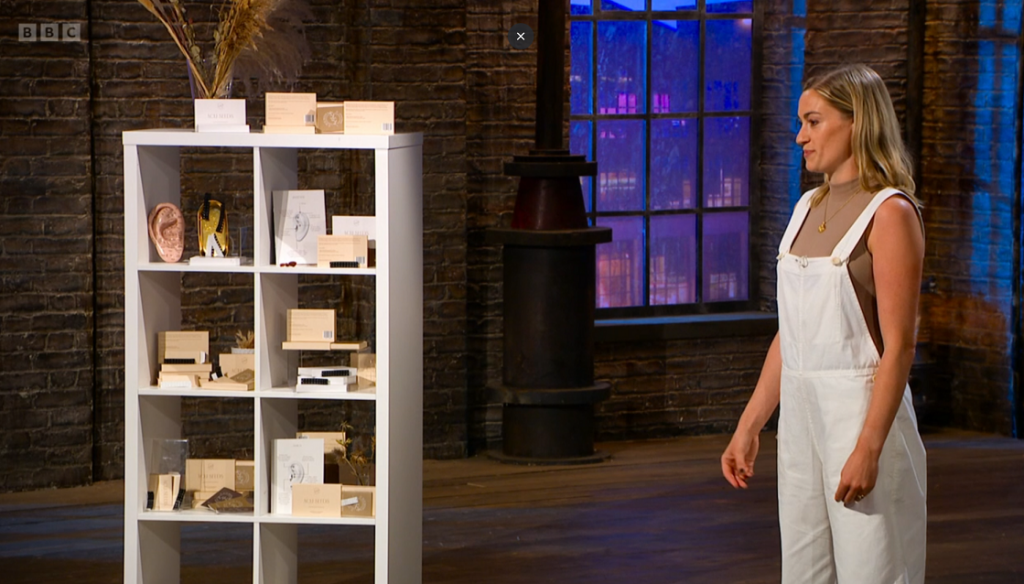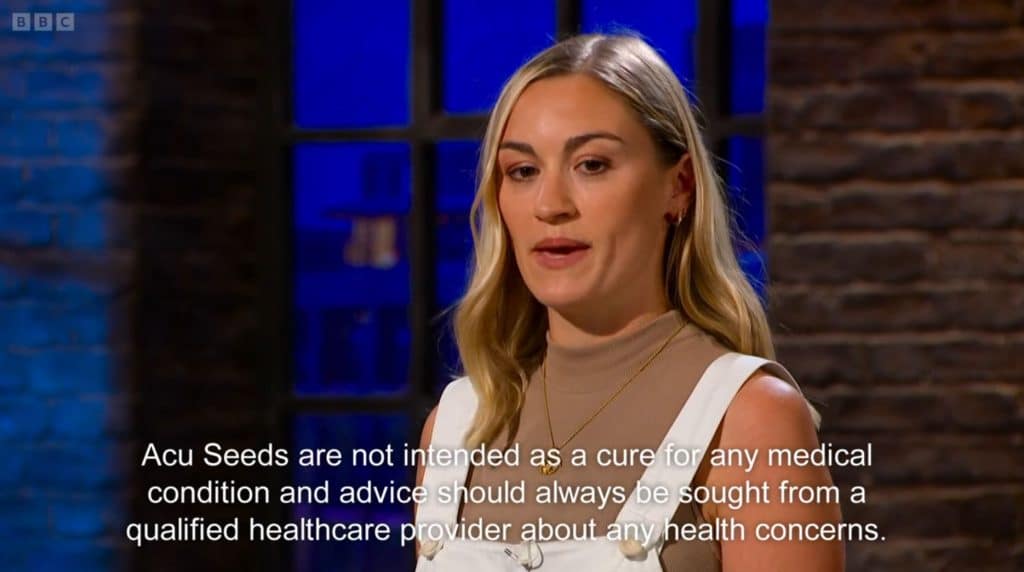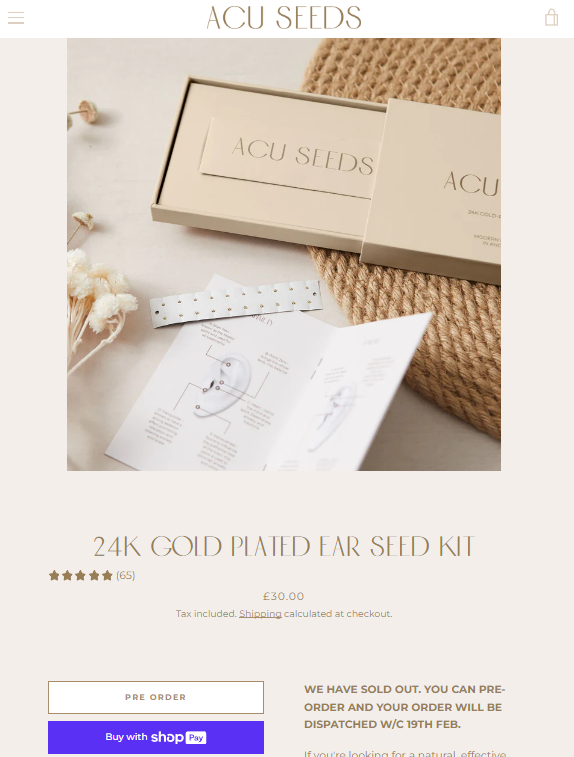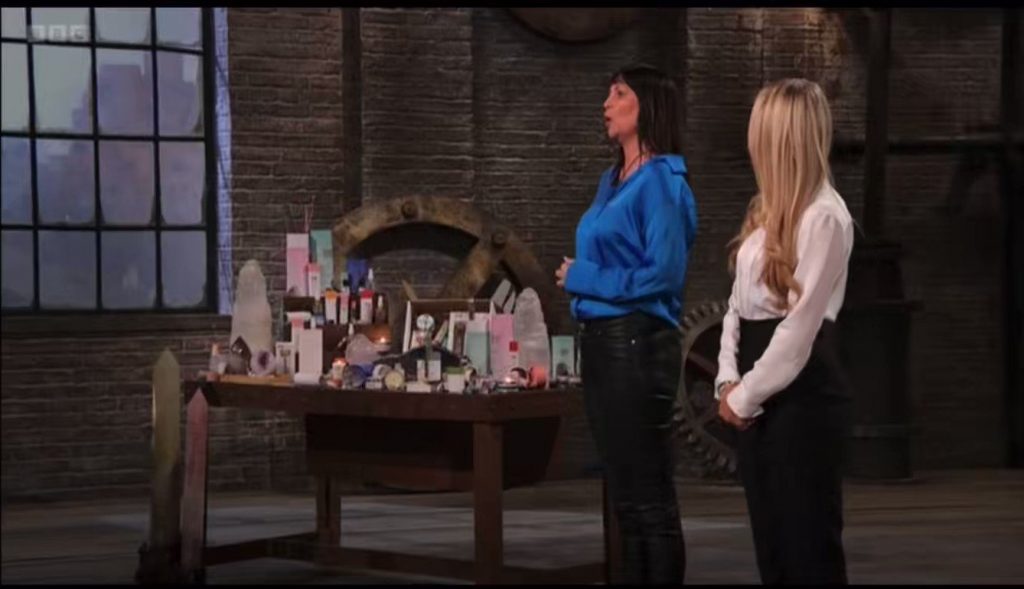The BBC One reality show Dragons Den has been making headlines for all the wrong reasons in the last couple of weeks. For those unfamiliar with the format, in each episode, several business owners pitch their products to a bunch of rich folk – or “dragons” – to be scrutinised and critiqued, with the hope of securing an investment, and an experienced (and, notably, famous) business partner.
Putting your business idea to people who are rich and willing to invest in businesses in return for primetime exposure on BBC One isn’t a bad concept, depending on what is being pitched… which is where things recently went awry, when former advertising executive turned entrepreneur, Giselle Boxer, entered the Den to pitch her business: Acu Seed ear seeds. As we’ve covered elsewhere, ear seeds are ornamental at best, and promoting them as a treatment for ME/cfs – even if the health claims on the show were carefully crafted to avoid being too explicit – promotes useless quackery to a cohort of patients who are, by definition, deprived of viable and proven alternatives.

While the on-air claims were just about sanitised enough to give the programme the fig leaf of plausible deniability, the claims Acu Seeds makes elsewhere are less covert. At the time of writing, their website claims their products can treat all manner of conditions, including “anxiety, migraines, hormonal issues, insomnia, weight loss and more,” while their customer testimonials boast about how ear seeds made a two-week migraine go away “in seconds”, were “an amazing tool for sleep, mood swings, anxiety and panic attacks,” and how for one customer the product was “a lifesaver for chronic pain and fatigue!”.
The website’s blog goes on to claim that ear seeds can ease post-workout muscle tension, support recovery, boost energy levels, help with hormonal balance during postpartum depression, improve focus and emotional regulation for people with ADHD, ease painful periods, improve immunity, and help with fertility issues. The company even goes as far as to sell – not give away, but sell – a “Women’s Health Guide“, which:
shows you how and where to place ear seeds for:
– menstrual issues
– libido
– fertility
– postpartum healing
– postpartum depression
– menopause
– anti-inflammatory
– weight loss.
None of this, of course, is supported by any evidence at all – a point upon which the Advertising Standards Authority agreed. In response to a complaint I submitted on Friday 19th January, I was told:
“Your complaint raises an issue which we know is likely to be a clear problem under the rules. In those circumstances, the Compliance team has all the information it needs and will work directly with the advertiser to bring about compliance. If the advertiser does not comply, the Compliance team can apply sanctions, and may ultimately refer the matter to our legal backstop, Trading Standards.”
The claims made by Acu Seed were so patently misleading that they required no further investigation by the ASA – which invites the question, how did the BBC manage to overlook such clear indications of quackery? It is a question I asked of the BBC, in a complaint I submitted after the show aired (one of many complaints, it transpires). In response, I was told:
“Dragons’ Den is an entertainment programme which features products created by entrepreneurs but is not an endorsement of them… This episode featured an entrepreneur sharing her own personal experiences that had led to the creation of a business. Her pitch asked for funding to expand her business selling ear seed kits, which she described as “an ancient Chinese medicine tool based on the principles of acupuncture, but without the needles”. The programme fairly reflected the Dragons’ responses on the day.”
I’m not wholly sure what issue the BBC feels this is addressing – the accusation wasn’t that criticism by the dragons was edited out; it was that the kind of criticism and due diligence that is the duty of the BBC to perform was entirely absent. The response continued:
“Viewers heard her explain her use of diet, acupuncture, Chinese herbs and ear seeds as part of her “personal healing journey” following an ME diagnosis. She stated that “this combination, I believe, aided my recovery within 12 months”. The ear seeds were never described as a cure for ME.”
This, too – deliberately or otherwise – misses the point, and I don’t imagine it is the BBC’s position that ME/cfs can be cured with an alternative medicine regime of which ear seeds play one part. Acupuncture, Chinese herbs and diet are as ineffectual a treatment for ME/cfs as ear seeds are – the issue, clearly, is that nobody in the making of the show felt it was their duty to highlight this. It concluded:
“Dragons’ Den does not, and has never, set out to offer medical advice and we believe its audience understands this. However in light of some concerns raised we have added the following clarification to the programme:
Acu Seeds are not intended as a cure for any medical condition and advice should always be sought from a qualified healthcare provider about any health concerns.“
Indeed, the warning has been added to the show, once it was re-edited and re-released on the BBC iPlayer.

It should be fairly apparent that this response is wholly inadequate. If the audience genuinely did understand that none of the medical claims made in the show were meant to be taken as medical advice, ME/cfs patients across the country wouldn’t be reporting that friends and family have been recommending ear seeds as a treatment for their condition, and the Acu Seeds website would not have had to issue a notice informing potential customers that the show has caused such a surge in demand as to leave them out of stock:

The rest of the BBC’s response is equally unconvincing – especially to suggest that an endorsement of the business by all six stars of Dragons’ Den should not be seen as an endorsement of the product. In the episode, Sara Davies raves “this product is brilliant,” explaining that she “gets ear seeds all the time” – but somehow, the viewer is meant to consider that something other than an endorsement. Indeed, each of the dragons complimented Gisele and her business, and everyone on the show felt that the business was deserving of an offer of their own money as investment capital – in what world is that not meant to be taken as a sign that the product and the business is credible? And if that does not constitute an endorsement, what possibly could?
This is not yet the end of this story, and I will continue to follow up with the BBC – in fact, I wrote an open letter to the Director General and the Standards Director, because I think there’s a bigger picture that risks getting missed with all of the (understandable and justified) focus on Acu Seeds: this is not the only time that Dragons’ Den have showcased alternative health businesses and inaccurate health claims, with no pushback from any of the shows stars.
Faux power cacao
As Gisele Boxer, founder of Acu Seeds, left the studio, investment secure from Stephen Bartlett, she may have crossed paths with the very next business owner to vie for the Dragons’ metaphorical gold: Liam Browne, of Full Power Cacao. Liam told the Dragons that after a complicated life, he had become “suicidally depressed”, and decided to embark upon a healing journey – which is when he encountered ceremonial grade cacao, and the healing properties he believes it possesses.
Adding colour to his pitch – this is prime-time television, after all – he had the Dragons chant a healing song over his own-brand chocolate drink, which he explained would increase the vibrational energy of the drink. Only Peter Jones seemed unconvinced by this, and as the pitch went on, not one of the Dragons’ seemed aware that hot chocolate does not have any healing properties, regardless of how many songs you sing to it.

Liam walked away on the with investment from Steven Bartlett, Gary Neville, and the no-longer-skeptical Peter Jones. Of the three, Neville seemed most excited about being able to give a leg-up to a fellow Mancunian (in itself, no bad thing), and the two Northerners went on to promote their new partnership on BBC Breakfast – a second high-profile and lucrative spot from which this commercial business could advertise their pseudoscientific product on the BBC.
On their website, Full Power Cacao claims there is scientific evidence to support the notion that cacao drinkers are less depressed – or, as they word it on the site, cacao “stops you feeling stressed and depressed”. The study they cite was carried out by Dr Sarah Jackson at University College London, who I contacted to ask how she feels about her research being used this way. She told me:
This study was purely correlational and reported an association between dark chocolate consumption and odds of depressive symptoms (nothing about ceremonial grade cacao or vibrational energy!). As we state in the abstract, we can’t draw any firm conclusions about whether this association is causal: ‘Further research capturing long-term chocolate consumption and using a longitudinal design are required to confirm these findings and clarify the direction of causation.’ Any such claims on the basis of this evidence are unfounded.
This makes sense – the study looked at reported levels of depression and reported levels of chocolate consumption, but at no point did it claim that depression and chocolate consumption had any causal relationship.
Again, we are to assume that the appearance on dragons’ den and the investment from the dragons is not an endorsement of Full Power Cacao… yet, on the company’s website, Liam makes clear that following his appearance on the show, he took two years’ worth of orders in just two days. The website prominently advertises their “Dragon’s Den Deal”, where you can get 22% off if you fill in their form.
The business evidently knows that appearing on a flagship BBC One entertainment programme and being seen by nearly four million viewers has a hugely positive effect on their bottom line. The appearance – and especially an appearance that ends with investment – is effectively a huge advert, in one of the most watched slots on the most credible broadcast channel in the country, if not the world.
Crystal gall
Dragons’ Den’s proclivity for quackery is not limited to this latest series. In January 2023, the show aired an episode in which the founders of Psychic Sisters pitched to the Dragons their range of healing crystals, and what incredible health benefits they can have. At various points, the Dragons told them: “You should be immensely proud” and “You are very impressive in what you have achieved in the short space of time you have. I would genuinely love to be a part of your world” and “I think Psychic Sisters is genius… you’ve actually turned it into something that’s quite cool”. They walked away with investment from Sara Davies and Deborah Meaden.

Not mentioned during their appearance was the fact that as part of their business, Psychic Sisters will also predict your future for £150, sell charms to “ward off the evil eye” and dispel malevolent curses, and offer a crystal “egg” to be worn inside the vagina to “aid muscle recovery” and “cleanse and purify the blood”.
Shortly after the episode aired, and prompted by my complaint to the ASA, Psychic Sisters updated their website to remove some of the more explicit health claims – evidence that they were unambiguously in breach of advertising regulations at the time that they were selected to be broadcast to four million households by the BBC’s premier channel.
According to a response I received from the BBC, it was reasonable to feature the company, because Psychic Sisters had already “launched their products on Asos, BooHoo and Holland & Barrett, so there appears to be a market for the products”. This is obviously irrelevant, because my issue was not that the business lacked sufficient demand, but that many of the products the business sold were ineffective and misleading. The BBC, it’s fair to say, has a responsibility to maintain standards that Holland & Barrett does not. BooHoo is not a public service broadcaster, and the fact that ASOS made what amounts to an error of judgement does not absolve the BBC of following suit.
The BBC also told me:
“It was stated that the online marketing wasn’t up to scratch and Peter asked specifically about how much funds they’re raising, and he pulled out when she couldn’t give him an answer. The programme didn’t claim that any of their claimed psychic abilities or clairvoyance were factual.”
Once again, this feels rather like an attempt to side-step the issue. The concerns raised by the Dragons about online marketing were that the business was too reliant on third party retailers, made too little money from direct sales, and had too small a social media footprint – none of which address the more important point that the very nature of the Psychic Sisters business is to sell pseudoscientific products. Healing crystals, charms to dispel curses, and predictions about the future are not based in evidence, and no increase in Instagram followers could alter that fact. Yet viewers of the episode would have been left with the impression that this was a business whose only issue was a faulty sales pipeline, and an inability to cite profit margins on demand.
Chasten the dragon
It is abundantly clear that not enough is being done by the producers of Dragons’ Den to uphold the standards of the BBC, and to safeguard the trust its audience has for one of the most respected broadcasting institutions in the world. That trust has been hard won, and it is galling to see it being lent to businesses that promote misleading and potentially even dangerous products, via health claims that target specific and vulnerable patient groups.
It’s hard to know quite where things are going wrong – whether the producers of the show are incapable of undertaking the basic research needed to weed out pseudoscientific businesses, or whether they simply do not care. It may be the case that they feel it is not their problem, and that all that matters is that the business idea makes for good TV, especially if it has a quirky angle or if the founders have a sad personal story they can hook their pitch around. I strongly disagree, and I can only hope the outcry from ME/cfs patients after this latest debacle has brought this issue into sharper focus for them.
Where prospective businesses make health claims or scientific claims, Dragons’ Den’s producers have a duty to check with experts to asses whether these claims are based in evidence – and if they are not, those businesses have no right to airtime and free advertising on the country’s leading and most respected broadcaster. No business should be lent the reach and legitimacy of the BBC in order to make misleading and potentially dangerous health claims for the products and services they sell.


